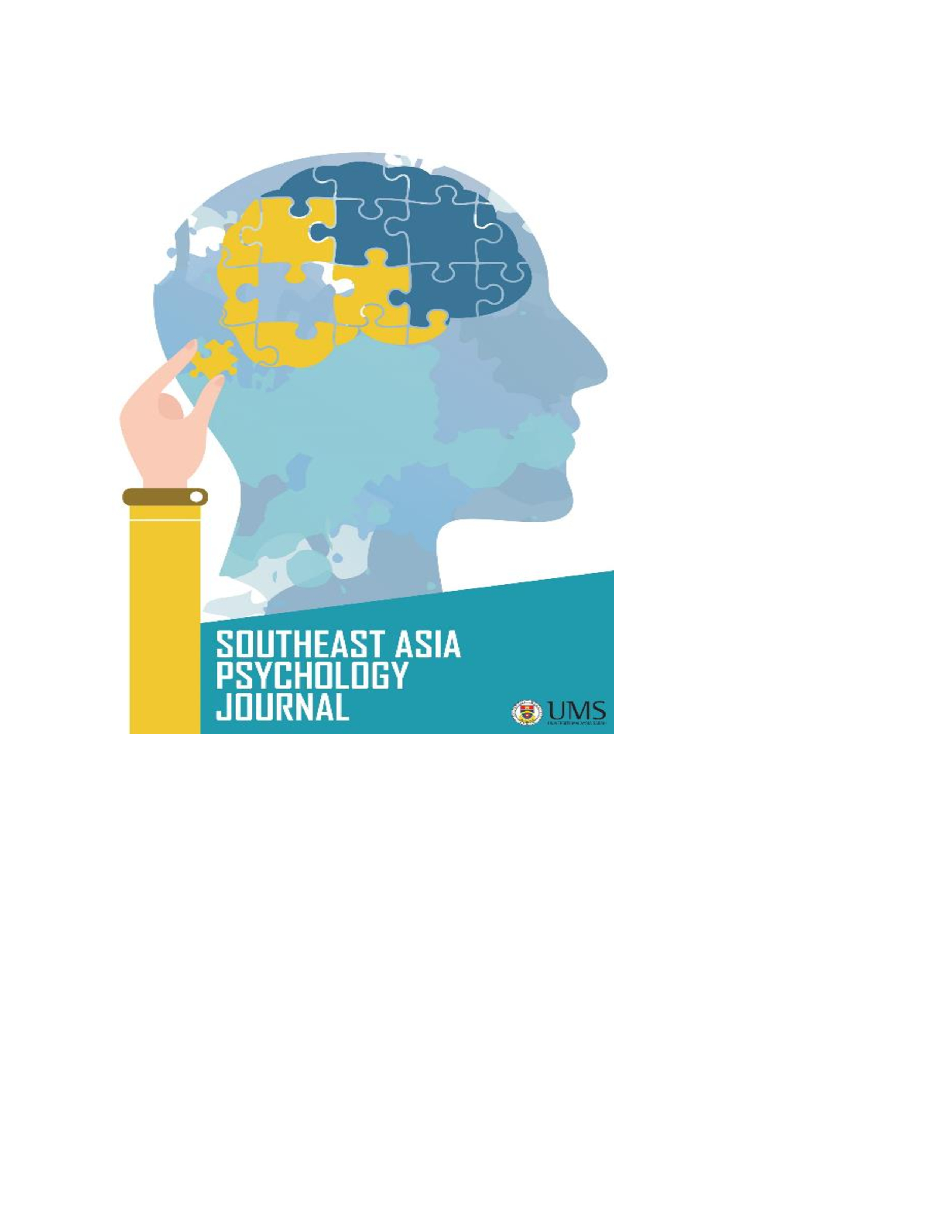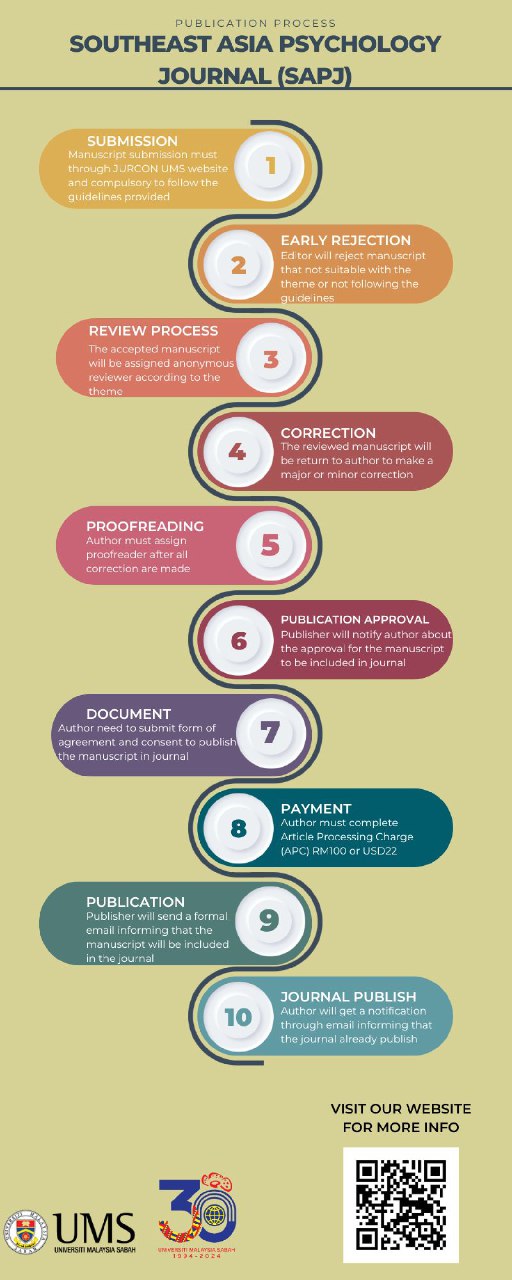THE ROLE OF ACADEMIC MOTIVATION IN PREVENTING STUDENTS' ACADEMIC PROCRASTINATION DURING ONLINE LEARNING AMID THE COVID-19 PANDEMIC
DOI:
https://doi.org/10.51200/sapj.v10i1.4918Keywords:
Intrinsic Motivation, Extrinsic Motivation, Academic ProcrastinationAbstract
Academic procrastination is a severe problem students faced during online learning amid the Covid-19 pandemic. One of the predictors that can reduce academic procrastination is increasing academic motivation. This research aimed to determine how academic motivation could affect students' academic procrastination during online learning amid the Covid-19 pandemic. A total of 619 students participated in this research. The Yockey Academic Procrastination Short Scale (APS-S) and Vallerand's Academic Motivation Scale (AMS) were used to measure procrastination and motivation, respectively. Academic motivation and academic procrastination were analyzed using multiple regression analysis. The results showed that academic motivation consisting of intrinsic, extrinsic, and amotivation influenced 15.6% of academic procrastination behavior. Intrinsic motivation and amotivation had a significant effect on academic procrastination. Procrastination tended to be done by men. Meanwhile, women's intrinsic motivation tended to be higher than men's, with higher extrinsic motivation in academics.
References
Abdi Zarrin, S., Gracia, E., & Paixão, M. P. (2020). Prediction of academic procrastination by fear of failure and self-regulation. Educational Sciences: Theory and Practice, 20(3), 34–43. https://doi.org/10.12738/jestp.2020.3.003
Aini, A. N., & Mahardayani, I. H. (2011). Hubungan antara Kontrol Diri dengan Prokrastinasi dalam Menyelesaikan Skripsi pada Mahasiswa Universitas Muria Kudus. Jurnal Psikologi Pitutur, 1(2), 65–71.
Alp, A., & Sungur, S. (2017). Investigating Relationship between Undergraduate Student’s Flow Experience, Academic Procrastination Behavior, and Calculus Course Achievement. Egitim Arastirmalari - Eurasian Journal of Educational Research, 2017(72), 1–22. https://doi.org/10.14689/ejer.2017.72.1
Ardura, D., & Pérez-Bitrián, A. (2018). The effect of motivation on the choice of chemistry in secondary schools: Adaptation and validation of the Science Motivation Questionnaire II to Spanish students. Chemistry Education Research and Practice, 19(3), 905–918. https://doi.org/10.1039/c8rp00098k
Argaheni, N. B. (2020). Sistematik Review: Dampak Perkuliahan Daring Saat Pandemi COVID-19 Terhadap Mahasiswa Indonesia. PLACENTUM: Jurnal Ilmiah Kesehatan Dan Aplikasinya, 8(2), 99. https://doi.org/10.20961/placentum.v8i2.43008
Batool, S. S., Khursheed, S., & Jahangir, H. (2017). Academic procrastination as a product of low self-esteem: A mediational role of academic self-efficacy. Pakistan Journal of Psychological Research, 32(1), 195–211.
Baun, S., Junias, M. S., & Benu, J. M. Y. (2020). Relationship Between Neuroticism Type Of Personality Academic Procrastination In Dawan’s Ethnic Students In The District Of South Central Timor. Journal of Health and Behavioral Science, 2(4), 241–251. https://doi.org/10.35508/jhbs.v2i4.2971
Beutel, M. E., Klein, E. M., Aufenanger, S., Brähler, E., Dreier, M., Müller, K. W., Quiring, O., Reinecke, L., Schmutzer, G., Stark, B., & Wölfling, K. (2016). Procrastination, distress and life satisfaction across the age range - A German representative community study. PLoS ONE, 11(2), 1–12. https://doi.org/10.1371/journal.pone.0148054
Biricik, Y. S., & Sivrikaya, M. H. (2020). COVID-19 Fear in Sports Sciences Students and Its Effect on Academic Procrastination Behavior. In International Journal of Applied Exercise Physiology www.ijaep.com (Vol. 9, Issue 10). www.ijaep.com
Driessen, E., Beatty, A., Stokes, A., Wood, S., & Ballen, C. (2020). Learning principles of evolution during a crisis: An exploratory analysis of student barriers one week and one month into the COVID-19 pandemic. Ecology and Evolution, 10(22), 12431–12436. https://doi.org/10.1002/ece3.6741
Goroshit, M. (2018). Academic procrastination and academic performance: An initial basis for intervention. Journal of Prevention and Intervention in the Community, 46(2), 131–142. https://doi.org/10.1080/10852352.2016.1198157
Hakim, N. R., Prihandani, S. I., & Wirajaya, I. G. (2017). Hubungan Manajemen Waktu dengan Kebiasaan Prokrastinasi Penyusunan Skripsi Mahasiswa Keperawatan Angkatan VIII Stikes Bina Usada Bali. Jurnal Stikes Bina Usada Bali, 05(1).
He, S. (2017). A Multivariate Investigation into Academic Procrastination of University Students. Open Journal of Social Sciences, 05(10), 12–24. https://doi.org/10.4236/jss.2017.510002
Klingsieck, K. B., Fries, S., Horz, C., & Hofer, M. (2012). Procrastination in a distance university setting. Distance Education, 33(3), 295–310. https://doi.org/10.1080/01587919.2012.723165
Kunanitthaworn, N., Wongpakaran, T., Wongpakaran, N., Paiboonsithiwong, S., Songtrijuck, N., Kuntawong, P., & Wedding, D. (2018). Factors associated with motivation in medical education: A path analysis. BMC Medical Education, 18(1), 1–9. https://doi.org/10.1186/s12909-018-1256-5
Kuśnierz, C., Rogowska, A. M., & Pavlova, I. (2020). Examining gender differences, personality traits, academic performance, and motivation in ukrainian and polish students of physical education: A cross‐cultural study. International Journal of Environmental Research and Public Health, 17(16), 1–21. https://doi.org/10.3390/IJERPH17165729
Lee, E. (2005). The relationship of motivation and flow experience to academic procrastination in university students. Journal of Genetic Psychology, 166(1), 5–15. https://doi.org/10.3200/GNTP.166.1.5-15
Limone, P., Sinatra, M., Ceglie, F., & Monacis, L. (2020). Examining procrastination among university students through the lens of the self-regulated learning model. Behavioral Sciences, 10(12). https://doi.org/10.3390/bs10120184
Lukman, N. (2018). Motivasi Berprestasi Dengan Prokrastinasi Akademik Pada Mahasiswa Demau Uin Raden Fatah Palembang Periode 2017/2018 .
Malkoç, A., & Mutlu, A. K. (2018). Academic self-efficacy and academic procrastination: Exploring the mediating role of academic motivation in Turkish university students. Universal Journal of Educational Research, 6(10), 2087–2093. https://doi.org/10.13189/ujer.2018.061005
Meeter, M., den Hartogh, C. F., Bakker, T., de Vires, R. E., & Plak, S. (2020). College students ’ motivation and study results after COVID-19 stay-at- home orders. Vrije Universiteit Amsterdam, December.
Muhammed-Shittu, A.-R. B. (2020). An investigation of the impact of the scholarship types on academic procrastination among the university students. Hungarian Educational Research Journal, 9(4), 668–688. https://doi.org/10.1556/063.9.2019.4.55
Nafeesa, N. (2018). Faktor-Faktor yang Mempengaruhi Prokrastinasi Akademik Siswa yang Menjadi Anggota Organisasi Siswa Intra Sekolah. Anthropos: Jurnal Antropologi Sosial Dan Budaya (Journal of Social and Cultural Anthropology), 4(1), 53. https://doi.org/10.24114/antro.v4i1.9884
Naz, S., Shah, S. A., & Qayum, A. (2020). Gender Differences in Motivation And Academic Achievement: A Study Of the University Students of KP, Pakistan. Global Regional Review, V(I), 67–75. https://doi.org/10.31703/grr.2020(v-i).09
Nurani, O., & Astuti, A. (2013). Motivasi Akademik Mahasiswa Divisi Bidan Pendidik Jalur Aanuvulen di Stikes Aisiyah Yogyakarta.
Rahman, I. K., Indra, H., & Kasman, R. (2018). Behaviour of Academic Procrastination and Guidance and. 2, 111–119.
Rakes, G. C., & Dunn, K. E. (2010). The impact of online graduate students’ motivation and self-regulation on academic procrastination. Journal of Interactive Online Learning, 9(1), 78–93.
Rakes, G. C., Dunn, K. E., & Rakes, T. A. (2013). Attribution as a predictor of procrastination in online graduate students. Journal of Interactive Online Learning, 12(3), 103–121.
Ramadhan, R. P., & Winata, H. (2016). Prokrastinasi Akademik Menurunkan Prestasi Belajar Siswa. Jurnal Pendidikan Manajemen Perkantoran, 1(1), 154. https://doi.org/10.17509/jpm.v1i1.3260
Reza, I. F. (2015). Hubungan Antara Motivasi Akademik Dengan Prokrastinasi Akademik Pada Mahasiswa. Humanitas, 12(1), 39. https://doi.org/10.26555/humanitas.v12i1.3827
Risnawati, E., Nuraqmarina, F., & Wardani, L. M. I. (2021). Peran father involvement terhadap self esteem remaja. Psympathic: Jurnal Ilmiah Psikologi, 8(1), 143-152. Doi: 10.15575/psy.v8i1.5652
Rohmatun, & Taufik. (2014). Hubungan Self Efficacy Dan Pola Asuh Otoriter Dengan Prokrastinasi Akademik Pada Mahasiswa. Jurnal Penelitian Humaniora, 15(1), 47–54.
Rusmaini, R., & Rahayu, P. Y. (2019). Analisis Faktor-Faktor Penentu Prokrastinasi Akademik Dan Pengaruhnya Terhadap Prestasi Belajar Mahasiswa. Jurnal Pendidikan, EKonomi, Dan Bisnis, 4(2).
Sagita, D. D., Daharnis, & Syahniar. (2017). Hubungan Self-eEfficacy, Motivasi Berprestasi, Prokrastinasi Akademik, dan Stress Akademik Mahasiswa. Jurna Bioketik, 01(02), 37–72.
Santelli, B., Robertson, S. N., Larson, E. K., & Humphrey, S. (2020). Procrastination and delayed assignment submissions: Student and faculty perceptions of late point policy and grace within an online learning environment. Online Learning Journal, 24(3), 35–49. https://doi.org/10.24059/olj.v24i3.2302
Schunk, D. H., Meece, J. R., & Pintrich, P. R. (2014). Motivation in education: Theory, research, and applications (4th ed.) (4th Ed). Pearson .
Stefenel, D., & Neago, I. (2020). Measuring academic engagement among university students in Romania during COVID-19 pandemic. 9, 3–29.
Tuckman, B. W. (2005). Relations of academic procrastination, rationalizations, and performance in a Web course with deadlines. Psychological Reports, 96(3 II), 1015–1021. https://doi.org/10.2466/pr0.96.3.1015-1021
Vallerand, R. J., Pelletier, L. G. , Blais, M. R. , Briere, N. M. , Senecal, C. , & Vallieres, E. F. (1992). The academic motivation scale: A measure of intrinsic, extrinsic, and amotivation in education. Edsucational and Psychological Measurement, 52(4).
Wardani, L. M. I., & Fatimah, S. (2020). Kompetensi pekerja dan efeknya terhadap work engagement: riset pada pekerja dengan horizontal education mismatch. Jurnal Psikologi Sosial, 18(1), 73-85. Doi: 10.7454/jps.2020.09
Wardani, L. M. I., & Firmansyah, R. (2019). The work-life balance of blue-collar workers: The role of employee engagement and burnout. Jurnal Psikologi Ulayat, 6(2), 227-241. DOI: 10.24854/jpu02019-238
Wardani, L. M. I., & Oktafiansyah, D. (2020). Employer Branding And Work Engagement In Non-Bank Financing Company. Jurnal Psikologi, 19(2), 153-175. Doi: 10.14710/jp.19.2.152-173
Wardani, L. M. I., Sekarini, D. A., Syaputra, R. D., Kartikawati, M. S., Dawanti, R., Mulia, D. D. A., & Malek, M. D. A. (2021a). Career of horizontal education mismatch workers: Career competency, job crafting, and work engagement. Journal of Education and Learning (EduLearn) 15(3): 414-424.
Yockey, R. D. (2016). Validation of the short form of the academic procrastination scale. Psychological Reports, 118(1), 171–179. https://doi.org/10.1177/0033294115626825
Young, A. E., Johnson, G., Hawthorne, M. J., & Pugh, J. (2011). Cultural Predictors of Academic Motivation and Achievement: A Self-Deterministic Approach. College Student Journal, 45, 151–163.
Yurtseven, N., & Doğan, S. (2019). Structural relationships among academic procrastination, academic motivation, and problem solving skill in prep class college students. Pegem Egitim ve Ogretim Dergisi, 9(3), 849–876. https://doi.org/10.14527/pegegog.2019.027
Zuraida. (2017). Hubungan prokastinasi akademik dengan prestasi belajar pada mahasiswa fakultas psikologi Universitas Potensi Utama. Kognisi Jurnal, 2(1), 30–41.








